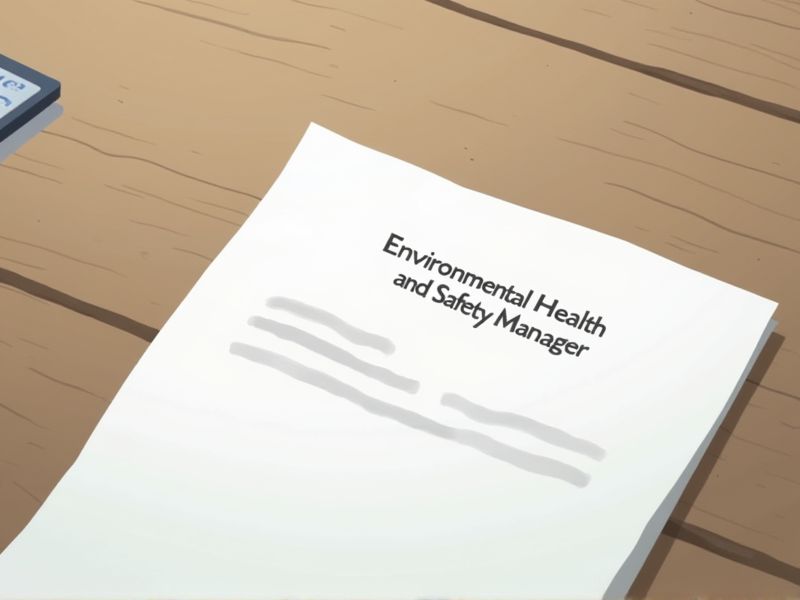
Environmental Health and Safety (EHS) Managers play a crucial role in safeguarding workplace environments and ensuring compliance with health and safety regulations. Possessing key certifications demonstrates a manager's expertise and commitment to maintaining high safety standards. Certifications provide credibility and deepen understanding of complex regulatory requirements, enhancing a manager's decision-making ability. Certain important certifications are often necessary for an Environmental Health and Safety Manager to excel in their role.
Certified Safety Professional (CSP)
The Certified Safety Professional (CSP) credential equips an Environmental Health and Safety Manager with advanced skills to identify and mitigate workplace hazards, leading to improved safety outcomes. Industries require EHS managers to have CSP certification as it validates their competency in handling complex safety regulations and standards. Organizations benefit from hiring CSP-certified professionals due to reduced risks and potential liabilities associated with workplace incidents. EHS managers with CSP credentials often drive better compliance rates, enhancing the company's reputation and operational efficiency.
Certified Industrial Hygienist (CIH)
Certified Industrial Hygienists (CIHs) possess specialized knowledge in identifying and controlling workplace hazards, enhancing the effectiveness of Environmental Health and Safety (EHS) management. Their expertise ensures comprehensive risk assessments, reducing incidents and maintaining regulatory compliance. CIHs provide critical insight into developing strategies for hazard mitigation, improving overall workplace safety. Their certification indicates a commitment to industry standards, enhancing the credibility and trustworthiness of EHS initiatives.
Certified Hazardous Materials Manager (CHMM)
Certified Hazardous Materials Managers (CHMMs) bring specialized knowledge that enhances an Environmental Health and Safety Manager's capability to manage hazardous materials effectively. CHMM certification signifies a high level of expertise, ensuring professionals are equipped to develop and implement safety protocols that comply with regulations. Their understanding of hazardous material management reduces risks associated with chemical exposure and environmental contamination. Incorporating a CHMM within the team enhances organizational safety culture and strengthens compliance with environmental health standards.
Associate Safety Professional (ASP)
An Environmental Health and Safety (EHS) Manager needs an Associate Safety Professional (ASP) certification to demonstrate a standardized level of expertise in risk management and hazard identification. Having an ASP credential often leads to improved credibility and trust, which can attract better job opportunities and compliance with regulatory requirements. Employers value the ASP because it signifies ongoing professional development and awareness of the latest safety practices. The ASP certification helps ensure that the EHS Manager has a recognized capacity for effective safety program implementation, critical for reducing workplace accidents and liabilities.
NEBOSH International General Certificate in Occupational Health and Safety
A NEBOSH International General Certificate equips Environmental Health and Safety Managers with essential knowledge of global safety standards, crucial for maintaining workplace compliance. Enhanced risk management skills from the certification enable managers to identify and mitigate potential hazards effectively. This qualification also fosters credibility and professionalism, enhancing the manager's capability to lead safety initiatives. Keeping pace with evolving legislative requirements, the certification ensures managers remain up-to-date with best practices and legal obligations.
OSHA 30-Hour Training Certification
Completing the OSHA 30-Hour Training Certification equips an Environmental Health and Safety Manager with comprehensive knowledge of workplace safety standards, essential for mitigating hazards. This certification ensures the manager can effectively implement safety protocols in line with federal regulations, reducing injury risks. Having this certification can enhance the organization's compliance, potentially lowering legal liabilities and insurance costs. Credentialed managers may also foster a safer work culture, improving overall employee well-being and productivity.
ISO 45001 Lead Auditor Certification
The ISO 45001 Lead Auditor Certification equips Environmental Health and Safety Managers with the skills needed to systematically assess and improve workplace safety protocols. Organizations increasingly demand compliance with international safety standards, and this certification provides the recognition necessary to fulfill those requirements effectively. Obtaining the certification enhances credibility, thereby boosting the manager's ability to influence safety policies across the organization. Also, the knowledge gained through this certification improves the manager's capacity to mitigate risks, leading to a safer work environment and reduced incident rates.
Certified Environmental Professional (CEP)
Certified Environmental Professionals bring specialized knowledge that ensures compliance with environmental regulations, significantly reducing the risk of legal issues. Their expertise enhances the development and implementation of effective environmental management systems, leading to more sustainable practices. They provide critical insights that improve workplace safety, directly correlating to reduced incidents and health risks. Having a CEP in an Environmental Health and Safety Manager position builds trust with stakeholders, demonstrating a commitment to environmental stewardship and safety.
Construction Health and Safety Technician (CHST)
Construction Health and Safety Technicians (CHST) play a crucial role in reducing workplace accidents, directly impacting overall project safety. Their expertise helps ensure compliance with regulations, minimizing the risk of legal penalties for companies. By conducting thorough on-site inspections, CHSTs identify potential hazards before they result in injuries, supporting a proactive safety culture. Their collaboration with Environmental Health and Safety Managers streamlines communication, resulting in a more efficient implementation of safety protocols.
Certified Professional Environmental Auditor (CPEA)
An Environmental Health and Safety Manager with a Certified Professional Environmental Auditor (CPEA) credential demonstrates verified expertise in auditing practices, crucial for maintaining compliance with environmental regulations. The CPEA credential equips managers with advanced knowledge needed to identify and mitigate risks effectively, ensuring a safer workplace. Organizations benefit from hiring CPEA-certified managers as they help reduce the likelihood of regulatory fines by addressing potential compliance issues proactively. The certification also instills confidence among stakeholders, reinforcing the organization's commitment to environmental sustainability and safety standards.
Summary
With EHS certifications, you can expect to improve your career prospects by enhancing your qualifications and credibility. Acquiring such certifications typically leads to a deeper understanding of regulations and best practices, ensuring safer workplace environments. Employers will likely view you as an asset, which may open doors to advanced roles and increased responsibilities. Overall, these certifications can result in better compliance with environmental standards, positively impacting both your organization and the broader community.
